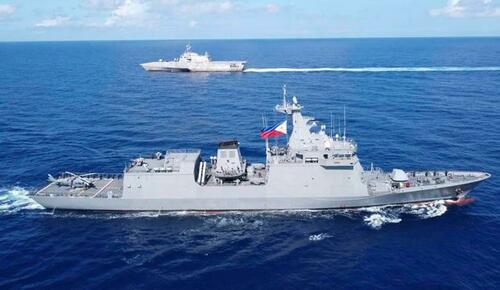US, Philippines Working On Intel Sharing Deal Amid Clashes With Chinese Vessels
Authored by Dave DeCamp via AntiWar.com,
The US and the Philippines are working on a new intelligence-sharing deal as tensions are soaring between Manila and Beijing in the South China Sea.
The Defense Post reported that US and Philippine officials discussed the potential agreement, known as the General Security of Military Information Agreement (GSOMIA), during talks held in Washington last week.

In a joint statement, the two nations said they wanted to conclude the GSOMIA by the end of 2024. The agreement would formalize intelligence sharing between the two militaries and create protocols for top-secret information.
The US and the Philippines are currently conducting the Balikatan exercise, a major military drill the two nations hold annually. This year’s iteration is being billed as the most "expansive" yet and includes exercises in Luzon, a northern Philippine province that faces Taiwan, and Palawan, a province on the South China Sea.
The South China Sea has become a potential flashpoint for a war between the US and China as Washington has committed to intervening if Philippine vessels come under attack in the waters.
Chinese and Philippine boats often have tense encounters near disputed rocks and reefs, which sometimes end in collision.
The US has been increasing its military presence in the South China Sea and is encouraging its allies, including Japan and Australia, to do the same. Alliance building in the region is a major aspect of the US military buildup that’s being done to prepare for a future war with China.
The latest clash among rival coast guard patrols happened Tuesday...
VIDEO: The Philippines said the China Coast Guard fired water cannon Tuesday at two of its vessels, causing damage to one of them, during a patrol near a reef off the Southeast Asian country. pic.twitter.com/Ro5kxk5DqW
— AFP News Agency (@AFP) April 30, 2024
In the joint statement released last week, the US and the Philippines committed to "expanding multilateral cooperation with likeminded countries, including through maritime cooperative activities, bilateral and multilateral exercises, and security cooperation coordination."